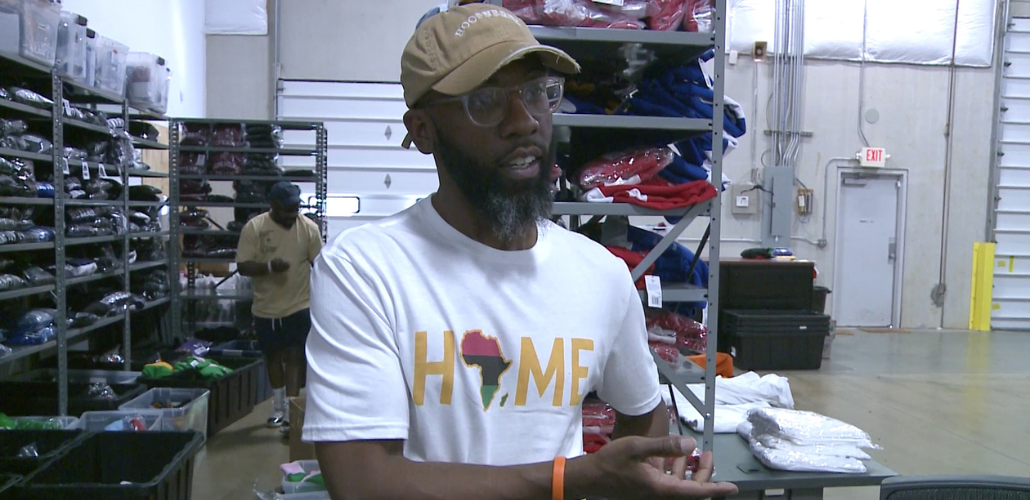If the Workers Take a Notion: ‘Works for All’ Showcases Union Coops

“Works For All,” 31 minutes, Bullfrog Films: 1-800-543-3764: Environmental DVDs and Educational DVDs
I remember Wisconsin carpenter Tom Crofton trying years ago to convince his local officers to create a worker cooperative to build affordable housing. Housing was an urgent need, he argued—and the union had the skills, the labor power, the organization, and the financial resources to do it. But the officers wouldn’t even consider the idea.
“Works for All,” the latest film by Mark Dworkin and Melissa Young, shows what can happen when workers and unions take worker coops seriously.
Their previous films, “Shift Change” and “WEconomics,” focused on worker cooperatives in Spain and Italy, showed how work and society can be different when the workers are in charge. In the new film, workers in a variety of industries in Cincinnati—childcare, solar installation, apparel manufacturing, home care, farming—share stories of how their worker coops were built, with union support, and the impacts on their lives.
The story is told by the workers and organizers themselves, with minimal narration. “That’s by design,” Dworkin says. “The film is not about us, it’s about them.” From their stories you get a fuller picture of what it can mean to be in charge of your own workplace—from better wages and decision-making power to fundamental respect.
In one telling moment, cooperative food hub (distribution center) manager Zeke Coleman talks about his previous job driving a truck for a pork company. The day after Barack Obama was elected president, he says, “when we walked into work... it was like a firing squad on Black males… It was like a nightmare... but I guess I had to go through that to appreciate what they are trying to do here in Cincinnati.”
In the co-op, he says, “I don’t have nobody chasing me around because of the color of my skin, or because I’m tall, or because I’m big… Here I feel like I’m treated like a person. It’s not a place where the CEO is making millions and millions of dollars while the workers are getting peanuts.”
A SOLIDARITY ECONOMY
Co-op Cincy was founded in 2011 as a joint project of the Steelworkers (USW) and the famed Mondragon cooperatives in Spain’s Basque Country. According to co-founder Ellen Vera, the nonprofit coordinates and supports a network of 12 worker cooperatives, mostly small ones.
Together these co-ops employ 100 people, about 50 of them worker-owners; a majority are people of color and over 60 percent are women. (Many worker cooperatives find that not all workers want to become worker-owners right away, or ever. In response, some co-ops limit the number of non-member employees or the length of time they can be employed. Some of Mondragon’s industrial worker cooperatives have grown by acquiring standard capitalist subsidiaries, especially in lower-wage countries. Researchers like Anjel Errasti have dubbed the resulting businesses “coopitalist multinationals.”)
Founded by labor organizers and unionists, Co-op Cincy enjoys the support of the Cincinnati Central Labor Council, and of USW Local 14734 and Food and Commercial Workers (UFCW) Local 75, which represent workers at two of the co-ops.
Why have a union, if the workers own the business? “A union creates a defined space for addressing workplace issues,” the Coop Cincy website says. “It’s also a reinforcing structure, helping a co-op keep its value intact. In addition, it connects workers to the larger labor movement, helping improve working conditions for all.”

SUPPORT LABOR NOTES
BECOME A MONTHLY DONOR
Give $10 a month or more and get our "Fight the Boss, Build the Union" T-shirt.
Co-op Cincy affiliate, Gem City Market in Dayton, Ohio, aims to become a multi-stakeholder cooperative in which the owners could include “consumers, producers, workers, volunteers, or general community supporters.” (In many consumer cooperatives—where the coop is owned by consumer members, rather than worker members—unions often play a more traditional role. Workers at outdoor goods co-op REI, for example, are currently organizing nationwide with RWDSU and UFCW.)
Vera is a staunch unionist—but like Tom Crofton, she wants more. “I know we have to do the defense work, we have to fight back,” she says, “but I also want to be proactively creating the type of world we want to see.” In Co-op Cincy this means not only creating individual worker cooperatives but also knitting them together, building a cooperative ecosystem like in the Basque Country or Italy’s Emilia-Romagna.
As Brazilian theorist Euclides Mance puts it, cooperatives can be organized for survival, resistance, or liberation. An ecosystem approach improves co-ops’ chances of survival, strengthens their capacity for resistance, and lays a foundation for social transformation aimed at creating a new “solidarity economy.”
GOOD TIMING
The time is ripe for converting businesses into co-ops.
In addition to “struggle conversions” where union workers take over after a strike or occupation, like New Era Windows in Chicago or the factory occupations in Argentina and Mexico, there is a “silver tsunami” of retiring baby boomers—and a surprising number of those who own businesses are interested in converting them to worker ownership.
Many organizations and resources are available to support them, such as the nonprofit Employee Ownership Centers that exist in many states and the U.S. Federation of Worker Cooperatives.
Unions could do more to support conversions and the creation of new coops. One of the biggest obstacles to conversion is raising the funds necessary to buy out the previous owners. Organizations like Seed Commons, Shared Capital, and The Working World offer or help secure financial support—but union pension funds could be a great source of the “patient capital” (not demanding payouts to investors right away) needed in these transitions.
“Works for All” is an excellent and inspiring introduction to union-coops and conversions, and should be part of your union’s resource list.
Matt Noyes is a Colorado-based solidarity economy organizer and educator. A longtime union activist and member of the Grassroots Economic Organizing collective, he is a co-author of Cooperatives at Work (Emerald, 2023).
